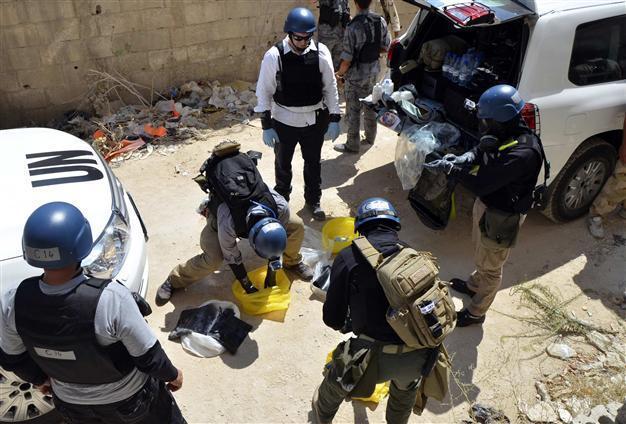Ankara in no doubt sarin gas used by Syrian regime
ANKARA

U.N. chemical weapons experts prepare before collecting samples from one of the sites of an alleged chemical weapons attack in Damascus' suburb of Zamalka in this August 29, 2013 file photo. REUTERS photo
Turkey once again voiced its conviction that it was undoubtedly the regime forces which used chemical weapons in Syria soon after United Nations experts confirmed sarin gas was used in the Aug. 21 attack in Damascus.According to Turkey, the U.N. Security Council should make a binding decision in order not to allow the Syrian regime to exploit the ongoing process following a deal reached in Geneva concerning the chemical weapons in the neighboring country.
U.N. Secretary-General Ban Ki-moon told the Security Council on Sept. 16 that the report of the U.N. Nations mission confirmed “unequivocally and objectively” that chemical weapons were used. As expected, the report did not say who carried out the attack.
U.N. experts said they had gathered “clear and convincing evidence” that surface-to-surface rockets took sarin gas into the opposition-held Damascus suburb of Ghouta on Aug. 21.
Ban said the report prepared by the experts “makes for chilling reading.” He added that the use of sarin had been proved “unequivocally and objectively” and that the Ghouta attack was “the most signficant” with chemical weapons since Saddam Hussein unleashed poison gas in Halabja, Iraq, in 1988, killing thousands. The U.S. ambassador to the United Nations, Samantha Power, highlighted the use of a 122mm rocket, which she said only government forces had. She also pointed to the “high quality” sarin used in the attack.
The Turkish Foreign Ministry recalled that the report didn’t use any clear expression regarding the perpetrators of the chemical attack, as it also noted that this stemmed from the limitations imposed on the delegation’s mission.
“Nonetheless, the quality and the method of use of the chemicals within the report is exposing – in a way leaving no room for doubt – that responsibility for this barbaric action belongs to the regime,” the Foreign Ministry said in a written statement released Sept. 16.
Turkey warned that a Russian-brokered Geneva deal calling for Syrian President Bashar al-Assad to give up the country’s stockpile of chemical weapons should be “rapidly and unconditionally” implemented so that the threat posed by the regime against regional and global peace and security could be eliminated.
Turkey also said that the U.N. Security Council should make a binding decision openly stating that precautions would be taken against the regime within the framework of the U.N. Charter’s Chapter 7 in order to prevent the regime from exploiting this process and in case of disobedience to the Geneva deal.
However, Russia said a U.N. Security Council resolution to implement an agreement to strip Syria of its chemical weapons will not be under Chapter 7 of the U.N. charter that allows the use of force.
“The resolution... will not invoke Chapter 7,” Foreign Minister Sergei Lavrov said today at a news conference with his French counterpart Laurent Fabius, saying this was already made clear at U.S.-Russia talks in Geneva and that the resolution would control the implementation of decisions taken by the Organization for the Prohibition of Chemical Weapons (OPCW).
He added that the U.N. report “proves that chemical weapons were used” but does not prove that the regime of Bashar al-Assad was behind it, he said, adding that “there is still no answer to the question of where the missile (used in the August 21 attack) was produced.”
There is still “most serious basis to believe that this was a provocation,” Lavrov said of the attack, calling on world powers not to “play up emotions” when making decisions, but rather “rely on professionals”. Fabius said however that the U.N. report left “no doubt that the Damascus regime was responsible” for the chemical attack. He said there was a “difference in approach” between France and Russia on the methods required to reach peace but the two sides were “perfectly agreed” on the need for a political solution.
















